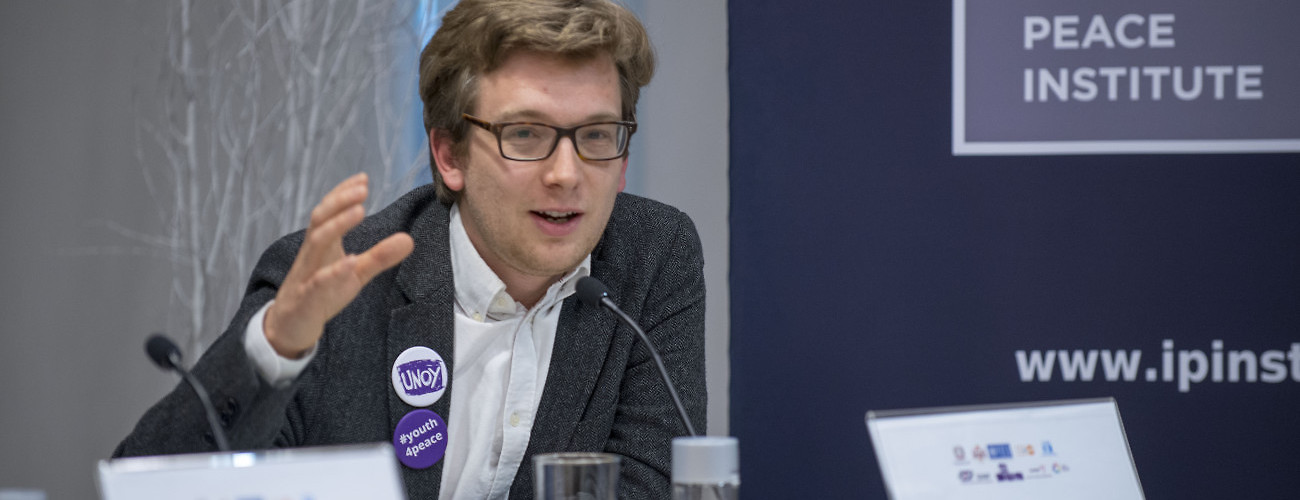Traditional approaches to policy-making on youth are “based on the assumption that young people fall in one of two categories, either young people are perpetrators of violence—a risk to be managed—or they are victims of violence—people the be protected from the evils of the world,” said Sölvi Karlsson, Leading Coordinator, United Network of Young (UNOY) Peacebuilders.
Reducing youth to these stereotypes has gender impacts, he said. “You have young men as perpetrators of violence and a risk, and young women who are victims and need to be protected,” he said. “Of course, both of these stereotypes can be true and they apply, often, but young people are so much more than that, they are not only perpetrators or victims of violence, but they can also be active agents of positive change.”
Karlsson spoke as part of an expert panel that aimed to draw out the lessons learned by the women’s and youth movements, as well as look ahead to the implementation of their signature resolutions of the UN Security Council.
Advocacy work on youth issues culminated with the adoption of Resolution 2250 on youth, peace, and security last year. Karlsson said there was much to be learned from what has been achieved since Resolution 1325 on women, peace, and security was adopted in 2000.
“In pushing for increased recognition or support in the role young people play in building peace, we in the youth movement have looked to the women’s peace movement, because in some ways, the women’s peace movement is several years ahead of us,” he said.
Laura Londén, Deputy Executive Director, United Nations Population Fund (UNFPA), agreed the resolutions shared similar philosophies. “Youth, peace, and security is well aligned with women, peace, and security in that it is inspired by a vision of inclusive conflict prevention and resolution where historically marginalized civil society actors have a place at the table with an opportunity to influence the agenda and that the voice of young women and adolescent girls,” she said.
Hajer Sharief, a UNOY Peacebuilder, joined the panel via video chat to share her perspective from Libya. “It’s really important for 2250, and the implementation of 2250, to take a very independent approach from the implementation of 1325,” she said.
During the Libyan peace talks, “Women and youth were often put in the same category, and there were no special measures in terms of what women need, or what youth need,” she said. “Of course, there is an intersection of the two topics, and there are young women, but we should focus on making 2250 not to be more or less under 1325.”
Betty Ogwaro spoke from her experience in South Sudan, where she is a member of the National Legislative Assembly, and works on empowering young girls through a program of the Global Network of Women Peacebuilders. It is important to bring the implementation of these resolutions to the community level, she said.
She said many of the girls between 15-25 who are receiving leadership, peacebuilding, and literacy training tell her, “Betty, we always wanted to participate in peace processes at the community level, but grown-up women won’t give us the chance. This program gives us the chance to talk.”
For Ogwaro, their remarks were “an eye-opener that young people, with their energy and knowledge, can put it in their community, they can even really stop things, small conflicts that could build into bigger conflicts,” she said.
IPI’s Youssef Mahmoud emphasized the importance of “peace” to the women’s and youth agendas. He said he hoped “to ensure that when we talk about youth, peace, and security, we don’t jump from youth to security and leave peace in animated suspension.”
The youth, peace, and security, agenda has for instance been closely associated in many public statements by UN members with plans to combat violent extremism (CVE).
Mahmoud cautioned against exclusively seeing Resolution 2250 in terms of security. “How to avoid that youth’s right to participate, to belong, to be heard, to be equal citizens, is not promoted through a security lens rather than a peacebuilding lens?” he asked. “Youth rights should be treated as an end themselves.”
The event was held as a side event to the UN’s 60th Commission on the Status of Women in partnership with the Permanent Missions of Italy and Jordan to the UN, the UN Peacebuilding Support Office, the UN Population Fund (UNFPA); UN Women; the United Network of Young Peacebuilders (UNOY Peacebuilders); Cordaid; the Global Network of Women Peacebuilders (GNWP); and the Working Group on Youth & Peacebuilding.
Benedetto Della Vedova, Under-Secretary of State for Foreign Affairs and International Cooperation from Italy, and Dina Kawar, Permanent Representative of Jordan to the United Nations, delivered opening remarks. Ahmad Alhendawi, the UN Secretary-General’s Envoy on Youth, joined them in welcoming participants in a video message.
Youssef Mahmoud, Senior Adviser, International Peace Institute, moderated the conversation.
Watch event:








